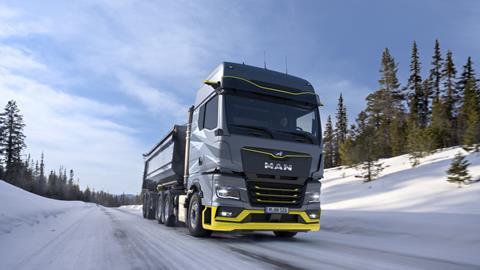MAN Truck & Bus is set to deliver around 200 hydrogen-powered trucks to customers as early as 2025, the manufacturer has revealed.
Announcing the move, MAN said the MAN hTGX is designed to transport heavy goods – such as construction work, tank transport or timber transport - and provides an environmentally friendly alternative to battery-electric trucks for use in areas without sufficient charging infrastructure or for markets where sufficient hydrogen is already available.
MAN insisted its primary focus remains on the development of battery-electric trucks. Friedrich Baumann, MAN Truck & Bus executive board member, responsible for sales and customer solutions, said: ”We are continuing to focus on battery-electric vehicles to decarbonise road freight transport. These currently have clear advantages over other drive concepts in terms of energy efficiency and operating and energy costs.
”However, trucks powered by hydrogen combustion engines are a useful addition for special applications and markets. We anticipate that we will be able to best serve the vast majority of our customers’ transport applications with battery-powered trucks.
”For special applications, hydrogen combustion or, in the future, fuel cell technology is a suitable supplement. The hydrogen combustion engine H45 is based on the proven D38 diesel engine and is produced at the engine and battery plant in Nuremberg.
”The use of familiar technology enables us to enter the market at an early stage and thus provides a decisive impetus for the ramp-up of the hydrogen infrastructure. With the hTGX, we have now added an attractive product to our zero-emission portfolio.”
MAN said the hydrogen drive is particularly suitable for tasks that require a special axle configuration or where there is no space for the battery on the frame due to the need for truck body work.
The MAN hTGX offers high payloads and maximum ranges of up to 600 kilometres in its initially offered 6x2 and 6x4 axle variants. The H45 hydrogen combustion engine used has an output of 383 kW or 520 hp and a torque of 2500 Nm at 900-1300 rpm.
The direct injection of hydrogen into the engine ensures particularly fast power delivery. With hydrogen compressed to 700 bar (CG H2) and a tank capacity of 56 kg, the vehicle can be refuelled in less than 15 minutes. With less than 1g CO2/tkm, the MAN hTGX will fulfil the criteria as a “zero-emission vehicle” under the new planned EU CO2 legislation.
Dr Frederik Zohm, MAN executive board member for research and development, added: “The new CO2 regulations at EU level will classify trucks with hydrogen combustion engines as zero-emission vehicles. This means that such vehicles fully contribute to our CO2 fleet targets, which also opens the door for this small series that complements battery electric vehicles.
”At the same time, depending on the country, our customers benefit from corresponding toll reductions, for example. At MAN’s Nuremberg site, we have the most innovative engine technology and decades of experience in the use of hydrogen as a fuel. We are utilising this and presenting a real MAN with the MAN hTGX.
”The new hydrogen combustion truck is based on the tried-and-tested TG vehicle series and impresses with the highest quality and uncomplicated maintenance. We will continue to research fuel cell technology based on battery technology and hydrogen. H2 fuel technology is also in preparation at MAN. However, it will be several years before the technology is really ready for the market and competitive.”
MAN has a long standing history with hydrogen drives, the company said it has been researching them for decades. MAN Truck and Bus presented the first hydrogen-powered bus at the Hanover Fair in 1996: the SL 202 city bus was powered by a natural gas engine that had been modified for hydrogen operation.
MAN said it is also developing and testing the hydrogen engine for the MAN engines division in a wide range of applications, including for special vehicles, such as snow cats, for trains on non-electrifiable routes and for excavators and cranes.

















